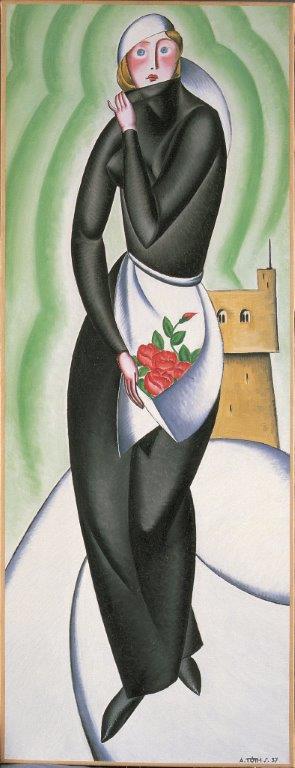Everything can be taken from a man but one thing: the last of the human freedoms – to choose one’s attitude in any given set of circumstances, to choose one’s own way. Viktor E. Frankl
Every step you take in the picturesque Dutch city of Deventer and every work of art you observe reminds you how vulnerable you are. Injustice, desolation and war are of all times. Suffering is inevitable. Yet there are always people who make an effort to work towards peace, justice and compassion.This Lent the art pilgrimage Art Stations of the Cross takes the visitor to cultural, historical, social and religious organizations and locations that formed and form the city of Deventer. A traditional station of the cross is represented in a new way at every stop by the interaction of the work of art with the locations where passion, enthusiasm and commitment to each other are visible in the local community. The route relates to the immaterial religious heritage of walking the stations during Lent. The artworks relate to universal themes that characterize the stations and refer to the past and present of the city. In 2020 the Netherlands celebrate the 75th anniversary of its liberation from Nazi occupation. This dark period in the city’s history is commemorated at the monument pictured above, but also at station 8 (the East-Indies monument) and 12 (Etty Hillesum Center).
The first station of this contemplative route is a new video installation, which was discussed earlier here. For the second station – Jesus takes up his cross – the pilgrim stops at the sculpture shown in the image above. Dutch visual artist and poet Arno Kramer created the monument An Interrupted Life in 1985. It commemorates the victims of World War II, while at the same time warning against contemporary forms of discrimination and violence. It is a large upward slanting stone broken in the middle. The way it is cut in two, the interruption, suggests the idea of a lightning strike. Despite the fact that a substantial part of the stone is broken off, symbolizing futures not lived, the original piece ends in a peak aiming upwards. There is a quote from the diary of Etty Hillesum (titled An Interrupted Life) chiseled in the stone: “One would like to be a band-aid on many wounds.” The text refers to her selfless efforts to serve the people in concentration camps.
Etty Hillesum, born in a secular Jewish family, spent most of her childhood in Deventer. As a student she lived in Amsterdam. In 1942 (at the age of 27) she began to write a diary. Her charismatic therapist whom she fell in love with, Julius Spier, encouraged her to do so. The intensification of the persecution of Jews and her devotion to the therapist made her open to spirituality. Julius read the Bible and prayed daily. Inspired by him, Etty developed her own faith, free from either Jewish or Christian dogmas. She matured in her own lifestyle which she captured in her diary: an authentic dialogue with the Creator God. She wanted to become a home for the vulnerable God and to be at home with the powerful loving God, in whom she met the indestructible force of love. This enabled her to transcend difficult circumstances and give her life to the service of others, the Other. At the age of 28, a year before she died, she wrote in her diary: “Suffering is not beneath human dignity.” Repeatedly, she had the chance to go into hiding and escape the death camps, but she decided not to do so.
She found that the meaning of her life was to serve at whatever cost, to ease suffering wherever possible, to love, to do good, and not to answer hatred with hatred. This is a similar attitude to life as that of psychiatrist and Nazi death camp survivor Viktor Frankl, who concludes in his book Man’s Search for Meaning: “The salvation of man is through love and in love.”
Etty had a so-called ‘proof of exception’ that allowed her to travel. Yet she decided to go back to camp Westerbork to be with her family and fellow sufferers. Later she was deported to Auschwitz. She threw a hastily written message from the window of the railway carriage. A farmer found the card and posted it. This is what she wrote:
Opening the Bible at random I find this: ‘The Lord is my high tower.’ I sit in the middle of a full carriage on my rucksack. Father, mother and Mischa are a few carriages away. The departure was still quite unexpected. A sudden order for us especially from The Hague. We left the camp singing.
She was murdered in Auschwitz on 30 November 1943. She was 29 years old.
***
Arno Kramer: An Interrupted Life – in Memory of Etty Hillesum, 1985, monument in Deventer, the Netherlands.
Arno Kramer (b. 1945) is a Dutch painter, sculptor, graphic artist, curator and poet. He is especially known for his drawings. He is recognized as an advocate of draughtsmanship in the Netherlands.
Anikó Ouweneel is a cultural historian and art curator. As a cultural heritage expert she focuses on placing modern art in ancient buildings. In 2019 she curated Art Stations of the Cross Amsterdam together with Marleen Hengelaar-Rookmaaker, this year she works on the same project together with artist Arent Weevers in Deventer.
The contemporary art pilgrimage Art Stations of the Cross was initiated by Aaron Rosen and Catriona Laing in 2016. After London (2016), Washington D.C. (2017), New York (2018) and Amsterdam (2019) the project has landed in 2020 in Deventer, one of the oldest and best preserved (Hanseatic) cities of the Netherlands.
***
This visual meditation was published on 23 February 2020 on ArtWay.

